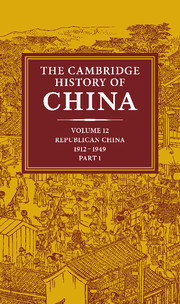Book contents
- Frontmatter
- 1 Introduction: Maritime and continental in China's history
- 2 Economic trends, 1912–49
- 3 The foreign presence in China
- 4 Politics in the aftermath of revolution: the era of Yuan Shih-k'ai, 1912–16
- 5 A constitutional republic: the Peking government, 1916–28
- 6 The warlord era: politics and militarism under the Peking government, 1916–28
- 7 Intellectual change: from the Reform movement to the May Fourth movement, 1895–1920
- 8 Themes in intellectual history: May Fourth and after
- 9 Literary trends I: the quest for modernity, 1895–1927
- 10 The Chinese Communist Movement to 1927
- 11 The Nationalist Revolution: from Canton to Nanking, 1923–28
- 12 The Chinese bourgeoisie, 1911–37
- Bibliographical essay
- Bibliography
- Index
- Republican China – physical features
- References
3 - The foreign presence in China
Published online by Cambridge University Press: 28 March 2008
- Frontmatter
- 1 Introduction: Maritime and continental in China's history
- 2 Economic trends, 1912–49
- 3 The foreign presence in China
- 4 Politics in the aftermath of revolution: the era of Yuan Shih-k'ai, 1912–16
- 5 A constitutional republic: the Peking government, 1916–28
- 6 The warlord era: politics and militarism under the Peking government, 1916–28
- 7 Intellectual change: from the Reform movement to the May Fourth movement, 1895–1920
- 8 Themes in intellectual history: May Fourth and after
- 9 Literary trends I: the quest for modernity, 1895–1927
- 10 The Chinese Communist Movement to 1927
- 11 The Nationalist Revolution: from Canton to Nanking, 1923–28
- 12 The Chinese bourgeoisie, 1911–37
- Bibliographical essay
- Bibliography
- Index
- Republican China – physical features
- References
Summary
The foreign establishment in early republican China had many facets: territory, people, rights established by treaty or unilaterally asserted, armed force, diplomacy, religion, commerce, journalism, freebooting adventure, racial attitudes. The pages that follow describe briefly the dimensions of each of the principal guises in which the foreigner impinged upon the polity, economy, society and mind of China. The physiological, intellectual and spiritual results of the foreign presence are still beyond our capacity to summarize.
THE FOREIGN NETWORK
Unlike India, South-East Asia (except Thailand) and most of Africa, China was not partitioned and ruled by the alien powers which imposed themselves upon the weakened Ch'ing empire in the last half of the nineteenth century. China was too big for any one power to swallow, and seemed too dazzling a prize for a satisfactory division of shares to be worked out. Consequently China's sovereignty was impaired, but it never came near to being vanquished. The foreigner had always to acknowledge that there was a Chinese authority, central or local, with which he had to contend. In some parts of China's territory, however, that authority was formally reduced, even ceded, in the interests of foreign claimants and as a consequence of demands to which China acceded only because she was too weak to refuse. These were variously treaty ports, concessions, leaseholds and spheres of influence.
Treaty ports
‘Treaty port’ is a protean term. The precise limits of the chiang-k'ou, literally ‘harbours’ or ‘anchorages’, were matters of dispute because the English text of the Treaty of Nanking (1842) granting foreigners the rights of residence and trade read, more broadly, ‘cities and towns’.
Keywords
- Type
- Chapter
- Information
- The Cambridge History of China , pp. 128 - 207Publisher: Cambridge University PressPrint publication year: 1983
References
- 12
- Cited by

